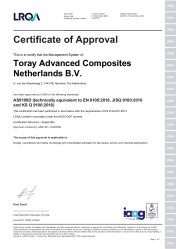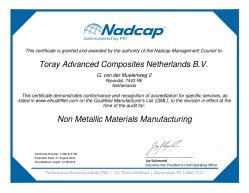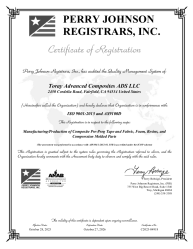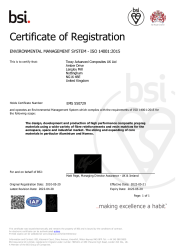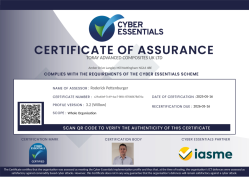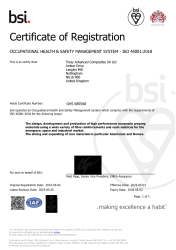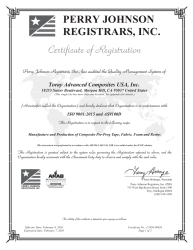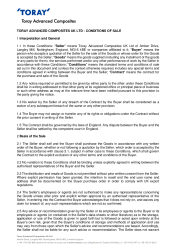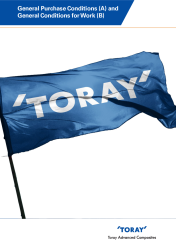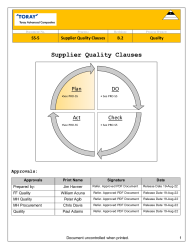Frequently Asked Questions
We're Here to Help
Our team have gathered responses to frequently asked questions, explore our FAQs below.
Still can't find the answer you need? Contact Us
In general, Toray materials are ordered from the manufacturing facilities where they are made. Toray maintains customer service personnel at our facilities in Fairfield, California; Morgan Hill, California; Langley Mill, United Kingdom; Camarillo, California; and Nijverdal, Netherlands, to help fill orders.
Visit our locations page for direct facility contact details.
Morgan Hill, California
- Aerospace thermoset prepregs, film adhesives, and syntactics
- Aerospace grade Cetex thermoplastic unitapes, fabrics, and laminates
- Toray AmberTool tooling prepregs
Fairfield, California
- Aerospace thermoset prepregs, film adhesives, and syntactics
- Compression molded parts and bulk molding compounds (thermoset and thermoplastic)
Langley Mill, United Kingdom
- Industrial and aerospace thermoset systems
- Toray AmberTool tooling prepregs
- Honeycomb core (global distribution)
Nijverdal, Netherlands
- Toray Cetex thermoplastic fabric prepregs
- Fabric-based multi-ply laminates
Camarillo, California
- Industrial grade thermoplastic composites (Nylon, PET, HDPE, PC/ABS, PP etc.)
- All footwear and footwear orthotic thermoplastic laminates
Toray takes pride in setting a high standard for responsiveness and lead times on deliveries. Our lead times are generally six to eight weeks for standard products. If we have the required raw materials in stock, then our lead times are normally less than six weeks, and can be expedited for faster delivery if needed.
Yes, Toray has a significant amount of data on various fibers and fabrics that were either generated internally or part of a screening/qualification program. In addition to mechanical data, Toray has a variety of specific data on our resin systems including CTE, outgassing, Tg, gel times and viscosities. Data sheets carry representative data on a small selection of fiber and fabrics. Please contact your account representative or Toray's technical service for more information.
Toray has a Toray AmberTool Processing Guide available on our website in the Resources section, under Processing Guides. Plus we have tooling experts on staff to answer any questions you may have.
Tooling prepregs are typically chosen by first considering the Tg of the tool to ensure it is capable of withstanding the typical cure temperature of the part. Ideally, one would like to see the Tg of the tool to be at least 10°C / 50°F higher than the cure of the part.
Second, a critical factor to consider is the processing temperature of the tooling board master. Since master materials are typically low Tg, it is critical that during the initial cure of the tooling prepreg master that it stays dimensionally stable. If the tooling master has a Tg stated maximum, then one would not want to exceed this during the cure of the tooling prepreg. Also, remember that tooling prepregs must undergo a final free-standing high temperature post cure to be able to withstand multiple part cure cycles and maintain long term durability.
Another consideration is the size of the tool and the outlife of the tooling prepreg selected. The outlife must be greater than the time taken to laminate and cure the tool.
Finally, will the tool deliver the quality of parts required for the duration of the project? The Toray AmberTool® HX-series of tooling materials have delivered expected life for decades. Typically, a standard life for a composite tool is greater than 250 cycles.
Yes, tools as large as 40 meters long x 3 metres wide (130 x10 foot) wide have been fabricated with the Toray AmberTool® HX series of tooling materials. Tools may be net molded or machine finished to final part dimensions. In net molding, a solid master is prepared to the exact part shape, with allowance made for thermal expansion. From this master, the final composite tool is molded.
In higher temperature or very large tools, the final tool may represent an oversized part shape and it is then machined to the exact size. This is commonly done for high temperature tools where the final cure temperature may create CTE distortions or in very large tools where final dimensional accuracy is more critical.
It is possible to cure and consolidate the Toray AmberTool® HX-series of prepregs with vacuum only pressure, but it is not recommended.
However, its highly likely that an increase in voids will occur. These can have a detrimental effect on surface finish and tool pressure integrity. For this reason, we do not recommend non autoclave processing of these products. For further advice please contact your technical service team.
Typically, a low temperature initial cure is carried out on a tooling board master. When this method is used, to maintain dimensional accuracy it is important to minimize thermal expansion. As such, Toray AmberTool® HX-series tooling prepregs are cured initially at a low temperature on the master, then they undergo an evenly-supported post-cure to reach their ultimate Tg.
Toray makes several large compression molded parts. The largest parts are approximately 60 inches long by 8 inches at the base by 12 inches high. This part can be seen on our parts gallery and is the Boeing/Bell V-22 wing fence which is made on Toray's 1000 ton press in Fairfield. Compression molded parts require up to 2,000 pounds per square inch of molding force, hence the actual maximum size of the part is a function of our press size.
Yes, Toray has both technical papers and a process guide for chopped fiber compression molding. Please refer to our Resources section on our website. Some of our processing guides are available in hard copy only, so please furnish your full mailing address so we can send them to you. Plus Toray has a team of subject matter experts to address any initial questions you may have. We also have experts on staff in tool design and part optimization methods.
Complex shaped parts that would be difficult to make with continuous ply carbon fiber prepregs can be made quite easily with chopped fiber compression molding techniques. Often the strength of a properly designed compression molded part would be similar in strength to a quasi-isotropic continuous fiber part in open hole compression, a key design value.
Bulk molding compounds (BMC) are typically offered in a one inch and a half inch length, typically in 1/8 inch width. Larger parts may utilize up to two inch fiber lengths. In general, the longer the fiber length the higher the tensile strength is of the final part. However, a long fiber length can not be used with complex, thin walled parts as the bulk molding compound flakes are relatively stiff. So a common length used is one inch.
As a result of numerous updates from federal and local regulatory agencies, we directly provide customers with the most current version of safety data sheets (SDS), rather than risk an outdated online version. Please send SDS inquiries from North America and Asia to explore@toraytac-usa.com. Inquiries from Europe may be sent to explore@toraytac-europe.com.
Toray Advanced Composites global manufacturing locations are in Fairfield and Morgan Hill, CA (USA) Langley Mill (UK) and Nijverdal (The Netherlands).
Contact us at explore@toraytac-usa.com for North American inquiries or in Europe at explore@toraytac-europe.com.
Alternatively, please feel free to contact us by phone at the following phone numbers:
Morgan Hill, CA Customer Service - +1.408.776.0700
Fairfield, CA Customer Service - +1.707.359.3400
Langley Mill, UK Customer Service - +44 (0)1773.530899
Nijverdal, Netherlands Customer Service - +31 (0)548.633.933
 Newsroom
Newsroom  Product Explorer
Product Explorer  Data Sheets
Data Sheets  Contact
Contact 

